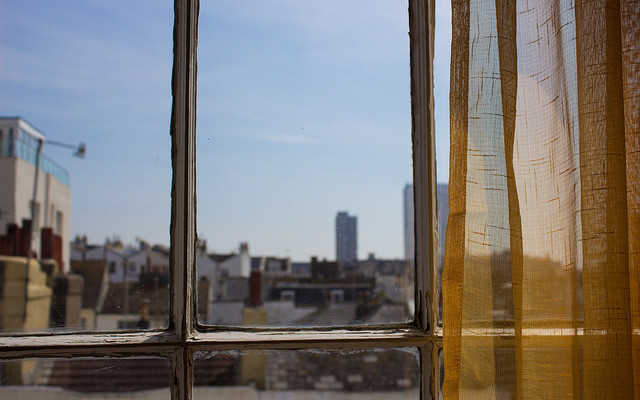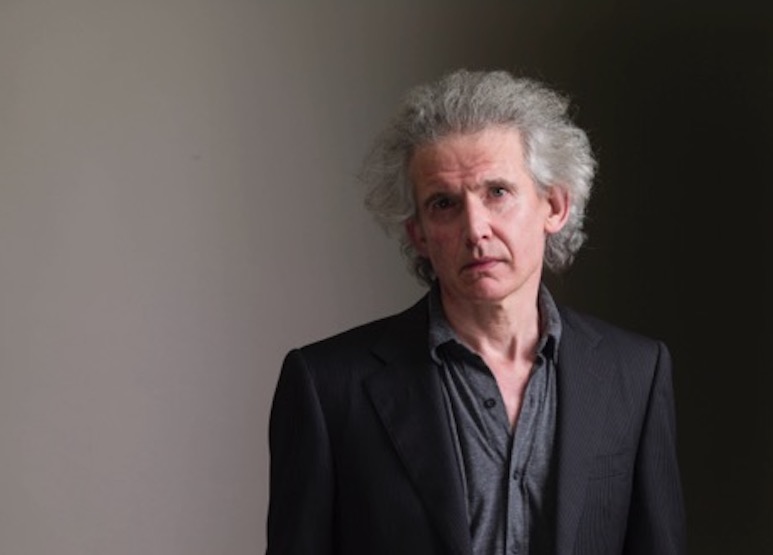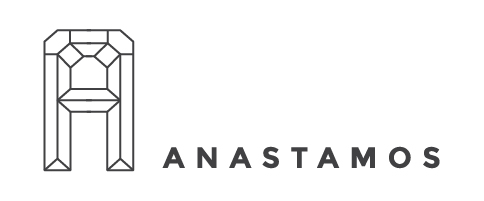Of Great Importance
Nachoem M. Wijnberg, Translated by David Colmer
DE GRENS
Over hoeveel tegelijk
kun jij nadenken? Stel nu
dat je een baan krijgt waarvoor je over
nog één meer moet nadenken. Zoals toen je
gevraagd was te beslissen waar
de grens zou komen tussen twee staten die toen nog
één waren.
Weet je nog iets wat zo is? De grens tussen
het land van de doden aan één kant
en een ander land aan de andere
of de grens tussen dag en nacht. En je hoeft
geen koning voor een dag te zijn
om straks die van een nacht te zijn in het land
over de grens.
Zou je iets hebben aan een assistent
die het één meer voor je
in zijn hoofd houdt, zoals de assistent
die je doorzaagt als je iets wilt laten zien
wat niemand kan geloven die er niet zelf
bij geweest is? Als een grap vraag je hem
of hij het niet erg vindt
zijn hoofd eraf te horen. Nee, zegt hij, zolang zijn hoofd er eerst
opgezet wordt.
Als je het een keer gedaan hebt
kun je overal grenzen gaan tekenen
van betere staten dan er nu zijn,
en je krijgt een jongen of een meisje om je te helpen,
maar jij moet in je eentje beslissen,
en die nieuwe grenzen worden op een onverwachte dag
bekendgemaakt.
Omdat je niet iedereen
gelukkig kunt maken
maar toch doorgaat met beslissen,
krijg je als betaling
schoonheid die rustig maakt,
dat is ook iets wat je, als het vaker gebeurt, makkelijker
aan kunt nemen.
The border
How many can you think about
at once? Say you get a job
that requires you to think about
one more. Like when you were asked
to decide where the border should be
between two states that were still one
at the time.
You know something else like that? The border
between the land of the dead on one side
and another land on the other side
or the border between day and night. And you don’t
need to be king for a day to later be
king for a night in the land
across the border.
Would it help if you had an assistant
who could keep track of the extra one
for you, like the assistant
you saw in half when you want to demonstrate something
that nobody who isn’t actually there
can believe? As a joke you ask
if she doesn’t mind hearing,
off with her head. No, she says, as long
as you put her head on first.
Once you’ve done it once
you can start drawing borders everywhere
for better states than the ones we have now,
and you get a boy or a girl to help you,
but you alone must decide,
and the new borders will be announced
on an unexpected day.
Because you can’t
please everyone
but continue to make decisions,
you receive as payment
calming beauty,
which is also something that you, when it happens more often,
find easier
to accept.
NIETS, NIETS, NIETS
Als je gevraagd wordt waarom je café café Austerlitz heet,
zeg je dat er een café Austerlitz was in de stad waar je vrouw vandaan komt en
jullie hebben jullie café ook zo genoemd.
En dan zeggen ze, ik zag een café Marengo, iets verderop, en een café Wagram
aan de overkant van de straat,
en je zegt, die zijn van goede vrienden, ik heb ze nooit gevraagd waarom ze hun
cafés zo genoemd hebben.
Dan vragen ze of Napoleon hier ooit geweest is of heeft hij iets anders met hier
te maken gehad,
en je zegt dat je niet veel over Napoleon weet, maar hij kwam toch uit Frankrijk,
en hij veroverde de halve wereld, maar niet hier.
Ten slotte vragen ze of je zelf van hier bent,
en je zegt, nee, van een kleine stad verderop, maar die is zo klein, die staat op
bijna geen enkele kaart.
Dan vraag je terug: wil je Napoleon doen, we hebben het decor en de kostuums
nog van de vorige keer dat we hem deden, je kunt ze zo meenemen,
maar misschien wil je beginnen met de revolutie?
Wie doet Danton, wie doet Robespierre, die ooit iemand iets zag kopen en het
leek zo moeilijk dat hij het niet uithield langer te kijken,
en wie doet Napoleon die later binnenkomt?
Jij, die altijd de meest trotse bent, doet Lodewijk de Laatste, en je schrijft elke
dag niets, niets, niets in je dagboek,
of: vrijheid, vrijheid, vrijheid, of: niets, vrijheid, niets.
Je vrouw komt binnen en vraagt, ben je vanochtend op jacht geweest en heb je
vrijheid geschoten;
als je die niet kapot geschoten hebt kan ik die klaarmaken voor het avondeten.
envoi
In je hoofd zijn ze allemaal dames,
mevrouw de Vrijheid, mevrouw de Revolutie, mevrouw de Verlichting,
en zelfs als ze een kop kleiner dan jij zijn
lopen ze op straat alsof je ze
van kilometers ver weg nog kunt zien.
Je ziet mij toch, waarom zeg je niets
tegen mij?
En hoe jij op straat loopt? In zoveel
jassen over elkaar
dat je schaduw de straat
vult waar je doorheen
loopt.
Nothing, nothing, nothing
If asked why your café is called the Austerlitz Café,
you say there was an Austerlitz Café in the town your wife comes
from and you gave your café the same name.
And then they say, I saw a Marengo Café not far away and a
Wagram Café across the road,
and you say, they are owned by good friends, I have never asked
them why they gave their cafés those names.
Then they ask if Napoleon was ever here or did he have something
else to do with this place,
and you say you don’t know much about Napoleon, but he was
from France, wasn’t he, not from here, and he conquered half the
world, but not here.
Finally they ask if you are from here yourself,
and you say, no, from a small town up the road, but that town is
so small, it’s on hardly any maps.
Then you ask in return: would you like to do Napoleon, we still
have the props and costumes from the last time we did him,
you’re free to take them,
but maybe you’d rather start with the revolution.
Who will do Danton, who will do Robespierre, who once saw
someone buy something and it seemed so difficult he couldn’t
bear to watch,
and who will do Napoleon who comes in later?
You, you’re always the proudest, you do Louis the Last and every
day you write nothing, nothing, nothing in your journal,
or: liberty, liberty, liberty, or: nothing, liberty, nothing.
Your wife comes in and asks, did you go hunting this morning
and did you shoot liberty?
If you didn’t blow it to bits I can prepare it for dinner.
envoi
In your mind they are all ladies,
Madame Liberty, Madame Revolution, Madame Enlightenment,
and even if they’re a head smaller than you,
they walk down the street as if you
can still see them miles away.
You can see me, can’t you, why aren’t you saying anything
to me?
And the way you walk down the street? With so many
coats on top of each other
your shadow fills the street
you are walking
through.
BACK IN THE USSR, VOOR FAIZ AHMED FAIZ EN ALESSANDRA PALMIGIANO
Een lezer van Marx uit Pakistan
bezoekt een oorlogsbegraafplaats in Leningrad,
toen de Sovjet-Unie er nog was,
en schrijft over wie met hun bloed de toekomst gekocht hebben
en gegeven aan wie zij nooit zouden ontmoeten.
Hij schrijft ook over Chopin
en ik denk even dat Chopin meer van mij is dan van hem,
wat weer laat zien hoe weinig ik snel weet.
Zeg mij, kameraad, hoe je, als het avond wordt,
naar het huis van je vader loopt,
in de heuvels,
waar je vader niet meer woont,
maar waar altijd nog wel iemand is die een lamp aandoet als het ochtend wordt.
Toen je vader een huis had voor na het werk,
op een berghelling,
niet ver van de kleine stad waar hij arts was,
stonden er twee palmen voor het huis,
de bomen rechtop in de scheve grond.
Je vader liet vrachtwagens aarde brengen
die hij zelf uitspreidde met een metalen hark en aanstampte,
omdat hij vlakke grond wilde,
waarop zijn kinderen konden spelen
en over de vallei konden kijken.
De twee palmbomen staan er nog,
de onderste meters van de stam verborgen in de aarde.
Hoe is het in een land
waar alleen maar helden wonen
die lang niet meer in hun eigen huis geweest zijn?
Het is niet goed voor een huis
als het lang leeg staat.
De bomen verliezen hun bladeren
en zwervers proberen het dode hout aan te steken
om het ’s nachts warm te hebben.
Back in the USSR, for Faiz Ahmed Faiz and Alessandra
Palmigiano
A reader of Marx from Pakistan
visits a military cemetery in Leningrad,
when the Soviet Union still existed,
and writes about those who bought the future with their blood
and gave it to those they would never meet.
He also writes about Chopin,
and for a moment I think that Chopin belongs to me more than
to him,
which immediately shows how little I know.
Tell me, comrade, how you, when evening has come
walk to your father’s house
in the hills,
where your father no longer lives,
but where there is still someone to turn on a lamp when morning
has come.
When your father had a house for after work,
on a mountainside,
not far from the small town where he was a doctor,
there were two palms in front of the house,
the trees standing upright in the sloping ground.
Your father ordered truckloads of soil,
which he spread with a metal rake and tamped down,
because he wanted flat ground
on which his children could play
and look out over the valley.
The two palm trees are still there,
the lower parts of their trunks hidden in the earth.
What is it like in a country
inhabited only by heroes,
who haven’t been in their own home for a long time?
It is not good for a house
to stay empty for a long time.
The trees lose their leaves
and vagrants try to set fire to the dead wood
to keep warm at night.
Provenance: Contribution
Poems first published in Nachoem M. Wijnberg, Of Great Importance, trans. David Colmer (Earth: punctum books, 2018), https://punctumbooks.com/titles/of-great-importance/. Published here under Creative Commons license BY-NC-SA 4.0 and by individual permission of the author.
 Nachoem M. Wijnberg (Amsterdam, 1961) is a Dutch poet and novelist. His poetry has received many awards, including the 2018 PC Hooft Prize, the most important career award in the Netherlands. His work has been translated into many languages, books in English include Advance Payment (Anvil Press/Carcanet, 2013), Divan of Ghalib (White Pine Press, 2016) and Of Great Importance (Punctum, 2018).He is also a professor at the University of Amsterdam Business School.
Nachoem M. Wijnberg (Amsterdam, 1961) is a Dutch poet and novelist. His poetry has received many awards, including the 2018 PC Hooft Prize, the most important career award in the Netherlands. His work has been translated into many languages, books in English include Advance Payment (Anvil Press/Carcanet, 2013), Divan of Ghalib (White Pine Press, 2016) and Of Great Importance (Punctum, 2018).He is also a professor at the University of Amsterdam Business School.
Featured Image: “Brighton on the palm” by Pavlina Jane licensed under CC BY-ND 2.0


No Comments